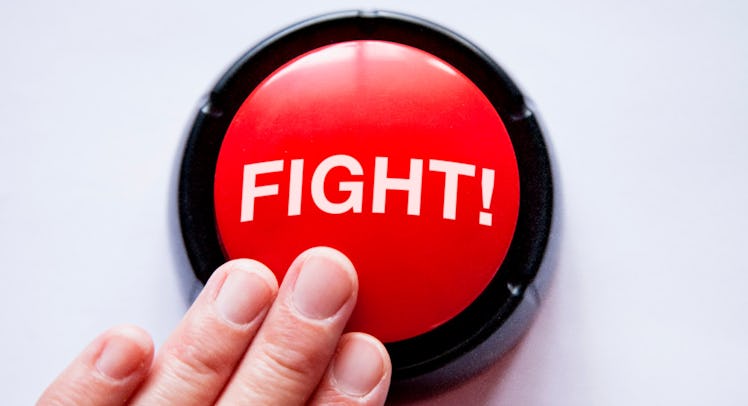Why You Pick Fights in a Relationship — And How to Stop
It happens. Here's how to kick the habit.

Marriage makes you a button-pushing pro. Husbands and wives know instinctively which small habits or phrases or actions annoy the hell out of their significant other. What spouse doesn’t, on occasion, loudly gargle a mouthful of Listerine on purpose to aggravate their noise-prone wife, or sneak in and spook an easily-scared husband in the shower? It’s fun and playful. But there’s another way certain people intentionally provoke their spouses that’s far less enjoyable: Picking fights.
Marriage is home to fights of every shape, size, and style. But some partners are wired to pick fights because they had a bad day or are just in the mood to spar. It’s a frustrating, exhausting habit that can quickly grind people down. t
So what drives someone to pick fights in a relationship? According to Courtney Glashow, LCSW owner and psychotherapist at Anchor Therapy in Hoboken, New Jersey, it usually stems from an unconscious projection of anger.
Say someone has a boss who pissed them off at work. They’re really not in a position to yell at their superior so instead they swallow it. That anger manifests in many ways, including the picking of fights.
Glashow says that, very often, people who look back at the arguments they start will have a tough time figuring out what made them angry in the first place. This, she says, is because they’re not letting their stress and anger out in a healthy way.
“You’re really holding it inside until you feel comfortable letting it come out around people you love — because you know they’ll be able to take it and love you unconditionally.”
If you’re prone to picking fights, it’s important to develop a sense of self-awareness and realize when you’re actually stirring things up. From there, you can walk it back a bit and try and determine the actual source of the anger.
“Was there something totally not related that made you angry before? Are you holding back feelings or thoughts and then letting them explode later?” Glashow offers. “You want to figure out what’s happening in your head with your thoughts. If you realize you’re having thoughts that you’re angry that your dry cleaner ruined your favorite suit then you may want to do something to help release that anger.”
In many cases, the root of one’s anger runs a lot deeper than a bad day at work or a traffic jam. Picking fights can speak to larger issues of resentments with roots that can sometimes stretch back years.
“Generally speaking when someone strikes out at someone it is because on some level they feel hurt, disrespected, or taken for granted,” says Kevin Darné the author of My Cat Won’t Bark! (A Relationship Epiphany). “Most of us have programmed ourselves to believe yelling, cursing, demanding, and fighting are signs of strength.”
To combat that deep-rooted anger, Darné suggests forming better habits and finding time to look inward.
“Whether it’s mediation, exercise, going for a walk, or listening to music through your earphones it helps to take a pause,” he says. “You are able to reframe the situation and see the big picture/potential outcome based upon which option you choose to go with.”
In the moment, Glashow suggests that fight-pickers take an all-important few seconds to breathe and collect themselves.
“Before you walk into your home at the end of the day or before you jump on a call with your partner, quickly do a mind and body scan in which you see how you’re feeling and what you’re thinking about,” she says. “Are you still bothered by something that happened earlier in the day that’s not related to your partner?”
For those who find themselves on the receiving end of an argumentative spouse, Randi Levin, a Transitional Life Strategist, says that not engaging can be the best strategy.
“When you feel as if you are about to be the recipient of someone picking a fight, decide not to play,” she says. “Don’t raise your voice, or make accusations, or indulge in the drama. Instead, look for ways to defuse the situation, to have empathy for the accuser, to seek a win-win. Make a choice to not have the argument, even if you have to temporarily separate yourself from the situation.”
For eager fight-pickers, Levin suggests trying to find a solution before they see the problem.
“When triggered and about to pick a fight, seek what would make that situation shift toward acceptance,” she says. “Where can a change in perspective alter how you respond or react to something or someone?”